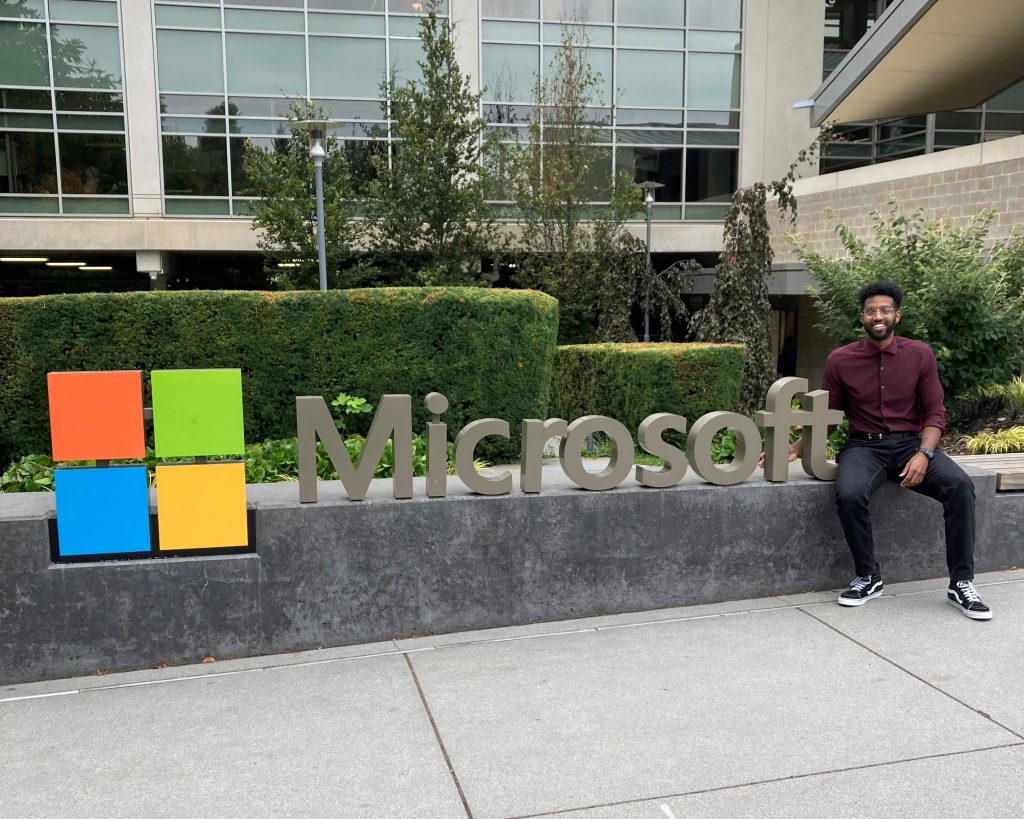
Shihab Khalfalla ’23 is a software engineer at Microsoft who graduated with a BS in Computer Science & Engineering and a minor in Math. During his time at UConn, he was an undergraduate research assistant and a UConn McNair scholar and fellow.
How have you gone about advancing in your career (promotions, salary-negotiations, switching careers, etc.)?
Besides my achievements in research, I have made sure to focus my efforts on creating
impactful work that could be displayed on a resume and be beneficial to my own learning, whether that be shown in the form of personal projects or through work that I have completed during my professional career. Through doing these, my name has become more likely to show up in conversations related to job offers, being given greater responsibility, etc.
How was the experience of networking for you, and how have you maintained these connections?
Networking was never my favorite thing to do, but it is essential to obtain many higher opportunities in my career. I maintain these connections through regular email conversations, where I update them on my career, as well as using LinkedIn to my advantage.
What challenges did you face as a first-generation professional when determining your career path?
I did not know what computer science or programming was until my final year of high school. Being the son of immigrants from a third-world country, my parents did not have access to many of these resources to show me this career path. As a result, I had a pretty late start to this when compared to my peers. Many do not realize how much of a difference it makes to have parents who already know how to navigate college and the corporate world, as you essentially learn everything on your own when it comes to anything professional or career-related.

What First-Gen related resources do you recommend pertaining to higher-education and career development?
I recommend that first-gen students make use of every resource they have available to them, specifically programs targeted towards their backgrounds such as first-gen. Personally, I started by joining Scholars House at UConn as a freshman. This opened me to many research- and learning-based opportunities, starting as a researcher at Legal Innovators, to becoming a McNair Scholar, to a visiting research fellow at Google’s explore CSR program hosted by Brown University. These experiences each came because of the previous one’s impact, similar to dominoes, but it all started with taking advantage of the programs UConn has available for its students, whether that be learning communities, research programs like McNair, or whatever else the university may have to offer.
How have you learned to create a work/life balance within your field? If any?
When it comes to my career, work starts at 9 a.m. and ends at 5 p.m. There has to be a clear line between your work and personal life; burning yourself out working past the day’s end or over the weekend burns you out for when you should actually be working. Also, despite not having to come into the office at my job, I still make the effort to come in often, since a separation between my work and personal life is important to creating that balance in your head. Fortunately, the culture at Microsoft emphasizes work-life balance, so I am often told by my peers and managers that if I need a rest day, I should take a rest day.
Was creating personal and professional boundaries within the workplace difficult? How did you navigate doing so?
At first, it was difficult to create boundaries between work and personal life, but as time went on, I learned that it was OK to keep conversations professional and to say no. This goes hand in hand with work-life balance, since if you don’t have that separation in your head, then it will be difficult to recognize boundaries when people cross them.
What advice would you give to a student beginning an experiential learning program such as a full-time internship or job-shadowing?
The biggest mistake I’ve seen from being on both ends of internships and shadowing opportunities is a lack of questions. When you enter an internship, fellowship, or shadowing opportunity, the purpose of it is to learn, and you can’t learn if you don’t ask questions and clear up confusing topics. It is essential to not only understand what you are going to do in the future but also to show your mentors that you care about what you are learning and are interested in the subject matter.
Did you ever find yourself or anyone you know going back to school for additional training or certification to advance your career opportunities? Would you recommend it?
Within the realm of computer science, graduate degrees do not seem to be too useful if your plan is to work in industry. Graduate degrees are most useful if your plan is to pursue research; however, according to many people I’ve spoken to in both industry and academia, it is not necessary to obtain a career in computer science.
